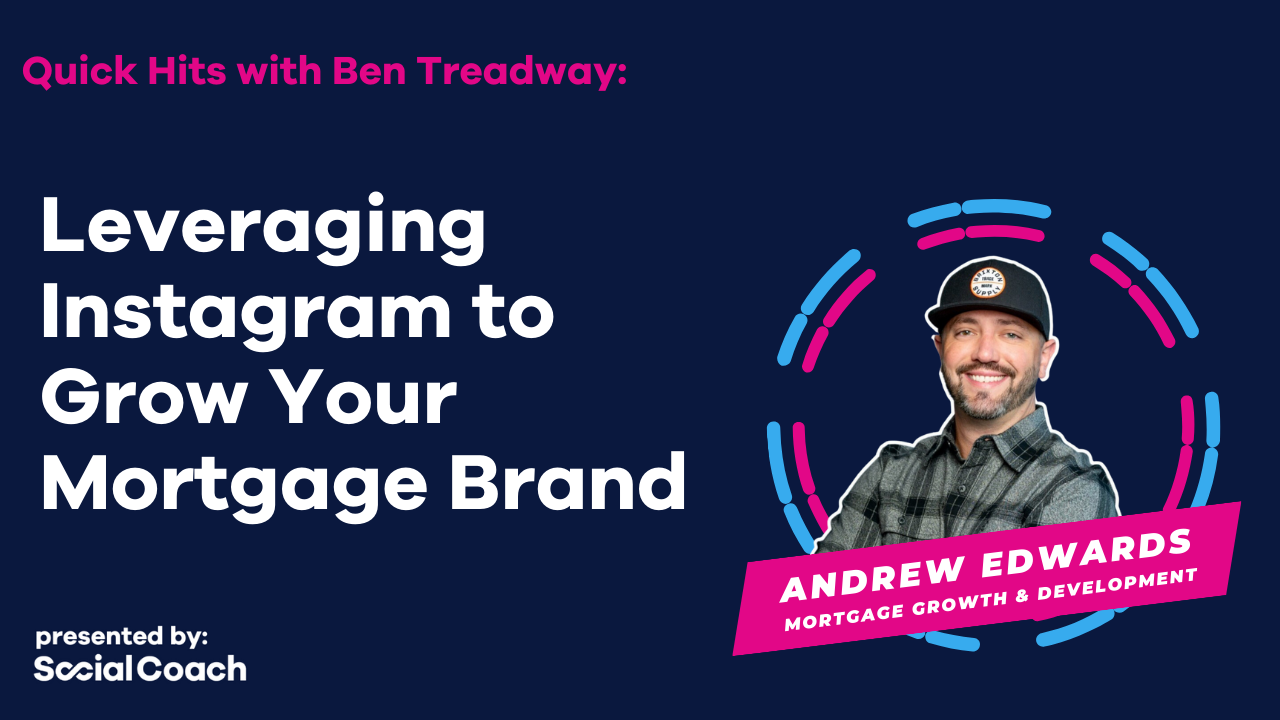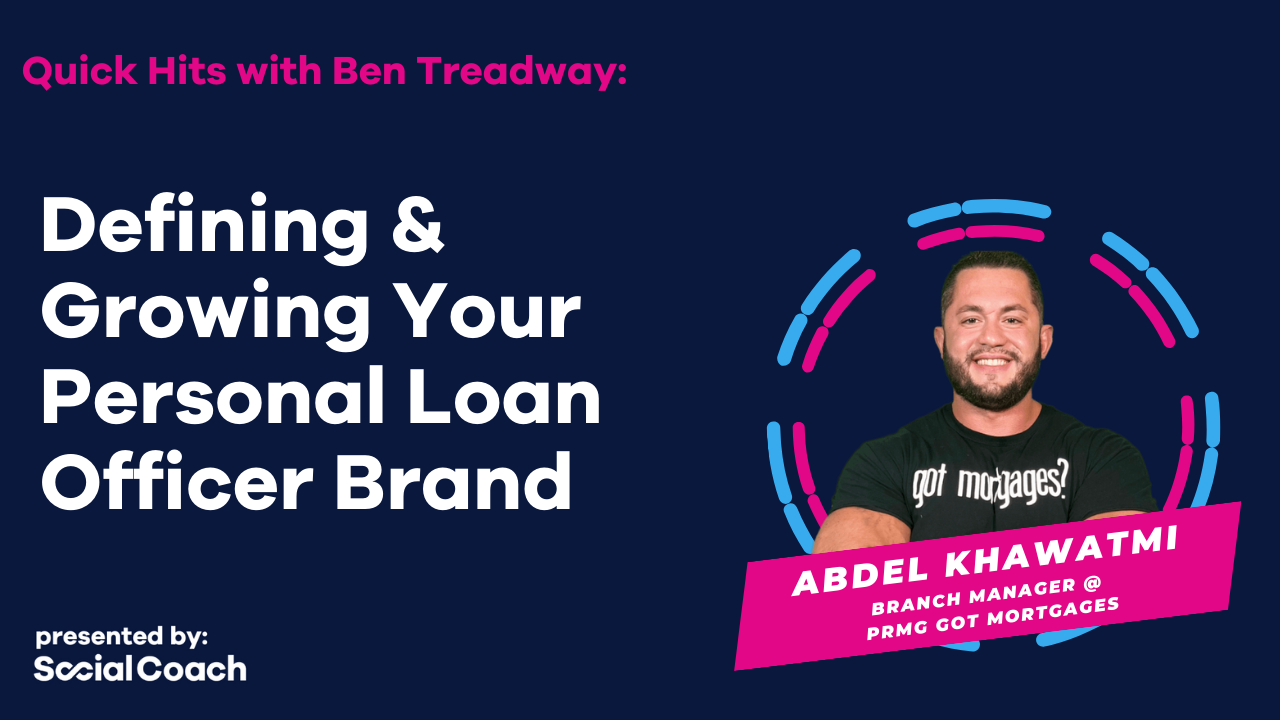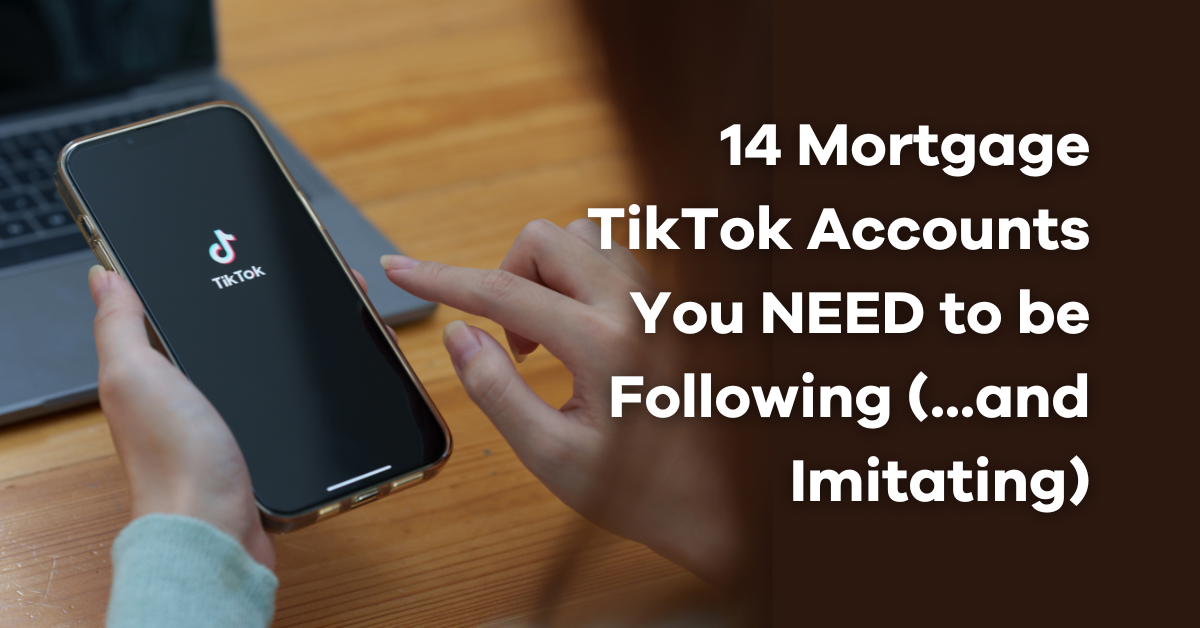3 Social Media Challenges Mortgage Companies Face (& How to Beat Them)
 Brandon Treadway
·
8 minute read
Brandon Treadway
·
8 minute read
Staying Authentic While Promoting Mortgage Products and Services
Ben: So first and foremost, how do you stay authentic and genuine on social media while still promoting your mortgage products and services?
Corey: Yeah, I think that's a great question. First, I would say that authenticity and genuineness can really only stem from who you are, so there's really no faking it until you make it when it comes to being authentic. And I think people can oftentimes read through artificially created corporate BS, for lack of better words that we sometimes see on social media.
That being said, that's why at ACM our commitment to authenticity really begins with a clear understanding and alignment with our core values. I'd say that we believe in transparency, integrity, honesty, taking ownership, delivering insightful education and guidance, and most importantly, really just putting people first.
And I think that these values are really what drive our social media strategy. And to that point, I would also say that we view social media not as just a platform for broadcasting our products and services, but really as a two way communication channel that allows us to share our ongoing story of who we are, who we're growing into, and at the end of the day, I think that people really want to work with a company that they feel like they know, like, and trust. And I believe that. It's really that approach that allows us to better connect with our audience.
And then the final thing that I would say to that is that we also leverage social media to engage in conversations, listen to feedback, and we use that feedback to continually learn from our audience, which keeps us grounded and really in touch with the realities that our clients are facing on a daily basis.
I think that one other critical part of our social media presence involves sharing the real life stories of our clients through video. So to us, you know, they are more than just client testimonial videos. They're impactful stories that really highlight the individuals and families that we've helped and how that help has really changed your lives for the better.
And I think it's by showcasing, you know, the genuine impact that our team, that our services make in the lives of those living in our local communities that help us stay true to who we are, what we do, and really help us highlight that through social media channels and really tie into our overall social media strategy.
How to Best Leverage Video
Ben: Love it. Video is so powerful, especially when you're telling actual stories rather than trying to get you know, product information out there.
Showing firsthand experience from clients on video is only going to be more beneficial as you kind of go into social media. And that's, that's a great idea for, for those that are you know, trying to get into video working with actual real life clients.
Corey: Yeah, I think the only other thing I would say just based on what you just said, I think a lot of people try to be too clever with it, right? Or they think they need to create a facade. And I think that if you just focus on who you are, at the end of the day, who you are is going to shine through at one point or another.
So I think just focusing on who you are and trying to gain an understanding of who you are. How you can capture that and then package it up to really showcase to other people, this is who I am, this is how I help people, this is why I help people. I think that that's where you start making an impact and you start going from being a, a company in people's mind to being more of a brand that they actually trust, that wanna work with and connect with.
The Biggest Social Media Challenges Facing Mortgage Companies
Ben: In your experience, what are the biggest challenges mortgage companies face when utilizing social media and how are you overcoming them?
Yeah, I think three of the biggest challenges that mortgage companies face when utilizing social media are:
One understanding the audience, which is to say that we need to recognize knowledge and try to speak to everyone across all the diverse demographics of our social media audience.
I'd say that this can make it difficult to target and tailor content that appeals to everyone. But again, going back to what I said earlier, I also think that if you're being authentic and genuine, and you're driven by your core values that put others first, I think that it's possible. Because again, you know, I don't need to change who I am for everybody that I meet.
If I just reflect who I am, and all of the things that I do. And I'm a good person and people see that I care about other people. I think that people are naturally attracted to that. The second thing I would say is balancing content mix. So to me, this means ensuring that you have a healthy balance of content between your more promotional content and your educational content, your value driven content and content.
That's meant to highlight your team and your company. And, how you help who your organization is trying to connect with.
And then the third one I would say is maintaining regulatory compliance. So compliance is not necessarily something that's fun, you know, for a lot of people to talk about.
I know that particularly on the loan officer side, sometimes that can be challenging because it's one of those things where. I just want to create the thing and then put it out there. But being that the mortgage industry is heavily regulated we need to ensure that all communications are compliant, which, you know to me means making sure that really we're being honest and not misleading.
I think that if you can make that mental shift between “I need to be compliant” to “I just want to be honest and forthcoming with my audience.” I think it changes the perspective that maybe some people have around how trying to negotiate or deal with compliance can sometimes be challenging, which is true.
But at the same time, if your focus is on being honest and not misleading and truthful and really trying to be helpful, then I think it kind of shifts your position on it. So I would say from a process standpoint. This is somewhat of an easy thing to set up with your compliance team, but I would also take it a step further.
I think that another, another crucial step to that is really actually building a relationship with your compliance team. You know, that way you're able to work through problems, questions and feedback together. And you're able to gain a better understanding. I think in some instances it can sometimes be a little combative, maybe between compliance or marketing from, you know, other people I've spoken with.
But I think once you start building relationships with people, this kind of goes back to the underlying theme of everything that I'm saying, which is really just putting people first. And if you do that, not just externally, but also internally, and you work to build those relationships, I think that there's a lot of positive fruit that you can glean from that.
Compliance is Honesty
Ben: Yeah. I like what you said about staying honest rather than thinking it's, it's compliance. And that's what it is, right? The more honest you are, the better relationships you're going to build. People want to trust the loan officer they go with. And if the first thing they see is some shady post that gives half-truths about potential mortgage rate discounts, like that is something that hurts right off the bat.
And eliminating that and staying compliant and just being honest with everyone helps to build those relationships long term.
Corey Shelton: 100%. And you know, I'd even say there's nothing wrong with showing in that example, say you were to show a rate with discounted points, there's nothing wrong with that. The key to it, though, is being forthcoming and honest about that, hey, here's the rate I'm showing you based on one discount point.
And if you take that approach, then again, that's where you're providing people with options, you're providing more educational content. And you're showing them what, what directions they can go. And then I think that really puts your loan officer team in a better position too, because instead of them being viewed as a commodity, then they're being viewed more as a service.
And is that trusted mortgage advisor, not just another loan officer where they're looking for what's your best rate for the day. And for us at ACM, I would say that's where we've seen significant positive feedback in that. Hey, you know, I could go anywhere, but I love working with your team because of the honesty the guidance, the direction, all of these things where nothing is being obfuscated or hidden.
You're putting everything out there for me to see. You're helping me understand it. You know, it's not this difficult, technical mortgage industry, jargon and lingo. It's breaking those things down and meeting people where they're at and then just providing them with options.
Thoughts on Instagram Threads
Ben: The last question. What are your thoughts on IG threads and do you think loan officers should be using it?
Corey Shelton: So we just started looking at IG threads. We're about to post our first post. I think today, I think that it's interesting and I'm interested to see how that impacts that, that community being that it's connected to Instagram.
Obviously it's, it's, you know, kind of being purported as an, as a Twitter killer. I don't know that that'll be the case. Cause I think once people find a platform that they're comfortable with, trying to move over to something new as it can be challenging which isn't to say that people aren't going to adopt it.
I think that no matter what people will adopt it, I'm also interested to see. How people react differently to that, where it is more text based versus the more visual focus that Instagram or Facebook have. So it's difficult to kind of predict where it's going to go, but I'm definitely excited to see where they take it.
Because I think that kind of where they're at right now is just their initial offering. And I'm pretty sure they have a lot more things that they're going to be working on to add additional value, maybe beyond what Twitter offers right now.
Ben: Yeah, my first impression is it seems like a fun platform.
Definitely not a complete platform. There's definitely some things that are going to be added in the future. And I think it'll only add to the benefit of the platform itself. I think for a loan officer, IG threads is a good option, but not necessary.
If you're feeling comfortable on Instagram and Facebook and engaging with your audience there, and posting good, solid content and seeing results, stay with and master your craft where you are before trying to adopt a new platform and totally change your strategy around it.
Corey Shelton: I completely agree with that. I would kind of bucket the IG threads conversation into Two different categories. One would be on the corporate side, which is a no brainer.
Just adding that into your social media strategy, I think, at least at this point in time with what they're offering, is fairly, you know, straightforward. On the loan officer side, I completely agree with you. You know, my background is in web development originally before I kind of took the role that I have right now, a long time ago.
And there's a thing called technical debt, right? Or scope creep. And it's one of those things where you only have but so much bandwidth, whether you're a team, and especially if you're an individual. And to your point, which I agree with 100%, is if there's something, if you're struggling to get into social media, threads may not be the best place to start off with.
I would probably start where there's a larger audience, where you can focus more of your time, attention, and energy on, such as Instagram, Facebook, LinkedIn, etc. And then maybe moving over there. If you're somebody where you're like, Hey, I already have all those platforms dialed in and I have a clear system and process that streamlines everything that makes me more efficient, more effective with it, then sure, go ahead and add in threads to your social strategy.
But I think that a lot of times people get. overwhelmed by all of the choices that they have. They kind of get that paralysis by analysis, right? And so that's where I would say that you don't have to, as a loan officer, you don't have to use everything. I think it's better to master one or two platforms versus being okay or trash at all of the platforms.
And so that would be my recommendation depending upon where you're at in your social media strategy. How you're creating social content. You know, if you're cruising along sure. Add threads to your stack. If not, and you're just getting started, then I would maybe focus on a couple of the other platforms where you're more likely to get a little bit more bang for your buck.
Absolutely. Hey man, really appreciate the time today. Love the answers and love the insight coming from you. I really appreciate you taking the time to jump on here today and stay tuned for the next episode of quick hits with Ben Treadway. Sounds good. Thanks, Ben. Really appreciate you having me on.
-01-1.png?width=1200&height=238&name=Logo%20-%20Social%20(V001)-01-1.png)


